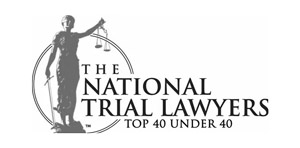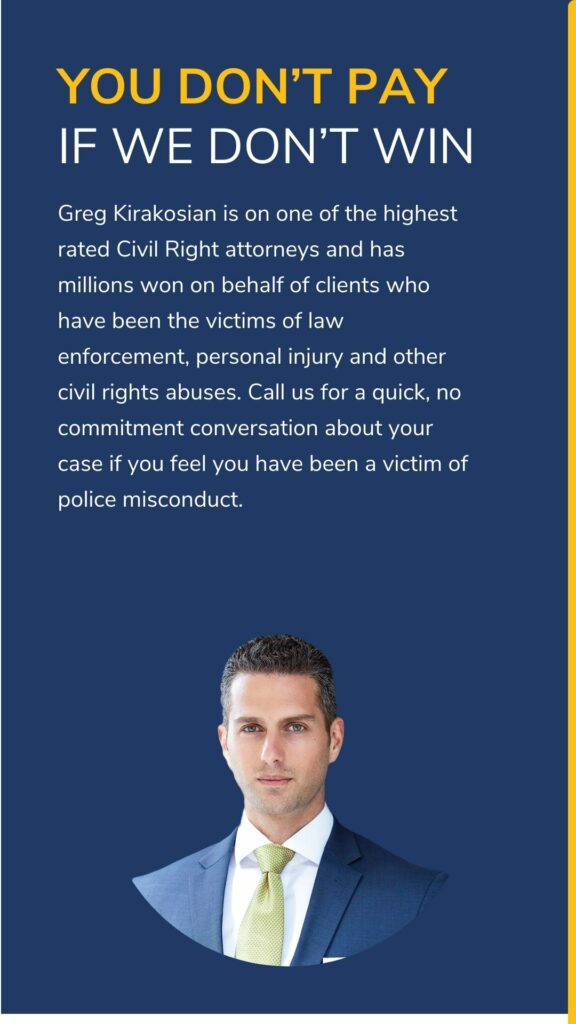Los Angeles' #1 Excessive Force Attorney










Police Misconduct and Excessive Force Lawyers Who Care
Police misconduct refers to any inappropriate or illegal actions taken by law enforcement officers while performing their duties. This can encompass a wide range of behaviors and actions that violate the law or ethical standards. Some common examples of police misconduct include:
Excessive Use of Force: The use of more force than is reasonably necessary to accomplish a lawful police purpose is considered excessive force. This can include physical violence, the use of tasers, batons, or firearms when not justified.
False Arrest or False Imprisonment: Unlawfully detaining or arresting someone without proper legal justification constitutes false arrest or false imprisonment.
Racial Profiling: Targeting individuals based on their race, ethnicity, or other protected characteristics rather than on evidence of criminal behavior is considered racial profiling.
Police Brutality: This term is often used broadly to describe any unjustified or excessive use of force by police officers.
Sexual Misconduct: Inappropriate sexual behavior or harassment by police officers, whether on or off duty, is considered misconduct.
Fabrication of Evidence: Falsifying or manipulating evidence to secure a conviction is a serious violation of ethical and legal standards.
Compensation for victims of police misconduct can be sought through various means:
Civil Lawsuits: Victims can file civil lawsuits against the officers and, in some cases, against the police department or municipality. Compensation may be awarded for damages, including medical expenses, emotional distress, and loss of income.
Internal Affairs Complaints: Victims can file complaints with the internal affairs division of the police department. Internal affairs investigations are conducted by the police department to determine if an officer violated department policies or procedures.
Criminal Charges: In cases of serious misconduct, criminal charges may be filed against the officers involved. If convicted, officers may face fines, imprisonment, or other penalties.
Police Misconduct Settlements: In some cases, police departments may offer settlements to victims to avoid lengthy and costly legal battles. These settlements often come with the condition that the victim agrees not to pursue further legal action.
It’s important to note that compensation and accountability for police misconduct can vary depending on the jurisdiction and the specific circumstances of each case. In recent years, there has been increased public scrutiny and advocacy for police reform to address issues related to misconduct and improve accountability within law enforcement agencies.

You Don’t Pay If We Don’t Win
As one of the nation’s leading civil rights attorney, we are sought after by many thanks to our successful track record when dealing with all forms of police misconduct. If you’re looking for an attorney or lawyer near you who specializes in police brutality, excessive force and more – look no further. We’re here to help you get the compensation you deserve and ensure your civil rights are met by members of the community who have sworn to protect and serve you.

Police Misconduct
Lyle Spruill was a victim of clear police misconduct and had his civil rights violated. Wrongfully arrested by the LAPD, Lyle’s case is just one of many Greg Kirakosian has won for clients who have been victims of all sorts of police misconduct.
Police misconduct refers to any inappropriate or illegal actions taken by law enforcement officers while performing their duties. This can encompass a wide range of behaviors and actions that violate the law or ethical standards. Some common examples of police misconduct include:
Excessive Use of Force: The use of more force than is reasonably necessary to accomplish a lawful police purpose is considered excessive force. This can include physical violence, the use of tasers, batons, or firearms when not justified.
False Arrest or False Imprisonment: Unlawfully detaining or arresting someone without proper legal justification constitutes false arrest or false imprisonment.
Racial Profiling: Targeting individuals based on their race, ethnicity, or other protected characteristics rather than on evidence of criminal behavior is considered racial profiling.
Police Brutality: This term is often used broadly to describe any unjustified or excessive use of force by police officers.




